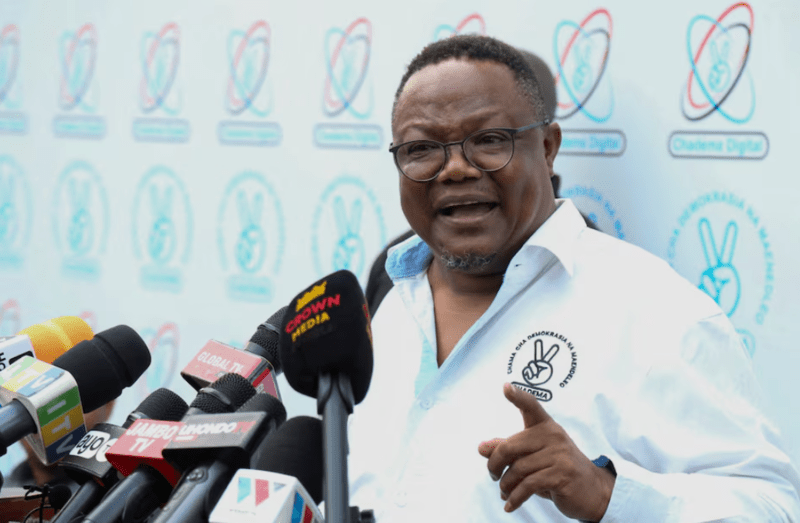Tanzania opposition leader Lissu accuses President Samia of ignoring electoral reforms, fuelling violence amid political crisis

Lissu detailed a series of findings by election observers and international actors, warning that the situation in Tanzania has deteriorated into intimidation, killings and unlawful detentions.
Tanzania’s main opposition party leader, Tundu Lissu, has slammed President Samia Suluhu for allegedly ignoring widespread calls for electoral reforms, saying the actions of the state have pushed the country into violence, unrest and a crisis of legitimacy.
While many observers from regional and international blocs flagged the October 29 polls as deeply flawed, Lissu argues that the government’s refusal to acknowledge these concerns has only worsened tensions across the country.
More To Read
- President Samia turns to the UN as Tanzania faces global pressure after deadly post-election violence
- Tanzania’s internet blackout challenged at East African Court of Justice
- Tanzania mourns as CCM MP Jenista Mhagama dies amid post-election tensions
- Canada reviews Tanzania partnership after deadly post-election crackdown
- Tanzania police issue fresh warning against nationwide demonstrations
- Tanzania police dismisses social media claims of unrest amid heightened security
In a statement issued from Ukonga Central Prison on Tuesday, Lissu detailed a series of findings by election observers and international actors, warning that the situation in Tanzania has deteriorated into intimidation, killings and unlawful detentions.
“Samia Suluhu Hassan was not elected and is not the legitimate President of our country. According to the preliminary report of the African Union (AU) election observers, the legal electoral procedures used were “…contrary to regional, continental and international standards and the election “did not adhere to the principles of the African Union, nor the norms and obligations of international law regarding democratic elections,” he said.
He added that the AU also noted that the environment surrounding the election before, during and after election day “…did not enable the election to be conducted peacefully.”
SADC observers also raised alarm over multiple irregularities, stating that the election period recorded higher levels of media suppression and restrictions on freedom of expression than in previous contests. They further reported “very low voter turnout at many observed polling stations, with some stations having no voters at all.”
The mission concluded that in many areas, citizens could not freely exercise their democratic will and that the overall process “failed to meet SADC’s 2021 principles and guidelines on democratic elections.”
The EAC observer team said it did not witness the national tallying of votes, noting it was not informed of the venue for the consolidation of results.
Lissu also referenced remarks by U.S. Senator Jim Risch, the Chair of the Senate Foreign Relations Committee, who argued that the elections were overshadowed by state-orchestrated political repression, enforced disappearances and deliberate interference long before polling day.
“On Wednesday, October 29, Tanzanians participated in elections dominated by political repression, abductions and sabotage by state agencies. The elections were long predetermined before October 29. Sadly, instead of heeding calls for reform and conducting transparent elections, the Tanzanian government responded with violence, resulting in hundreds of deaths and widespread abductions and arrests,” Senator Risch said.
Lissu also referenced the Tanzania Episcopal Conference (TEC), which described the aftermath of the elections as a period marked by “killings, injuries, disappearances, destruction and loss of both private and public property.” The Catholic bishops blamed the situation on President Suluhu, her government and the ruling CCM party.
He went on to revisit the 1992 Nyalali Commission findings, which recommended political reforms and the creation of an independent electoral commission. The commission warned that “the result of using force is disruption of peace and abrupt changes in an atmosphere of fear.”
Lissu said CCM rejected the recommendations then and continues to do so, fuelling recurring political crises.
TEC further warned that ignoring citizens’ demands for democratic governance has long created elections that lack competitiveness, truth, transparency, freedom and credibility. They cautioned that “when citizens are not heard, they will speak in the language they know.”
Lissu echoed this sentiment, invoking Bob Marley’s words that “when one door is closed, many others open,” and former U.S. President John F. Kennedy’s warning that “those who make reforms impossible make revolutions inevitable.”
He argued that President Samia and CCM have shut the door on peaceful reforms.
“Samia Suluhu Hassan and CCM have refused to listen to citizens; now the people are speaking in the language they know—protests. Their actions have closed the door to reconciliation and peace; now the doors of people’s power have opened everywhere in the country,” he said.
He warned that those responsible for election-related abuses must face justice.
“We must reorganise to ensure that the heads of security agencies and all those involved in the killings of our people are held accountable,” he said.
He urged unity in restarting the process of securing a new constitution that protects rights, dignity, fairness and truth.
Lissu said the blood of those killed, injured or harmed while demanding democracy would not be shed in vain.
“Let that blood become the ink that will write the new constitution that guarantees our humanity and protects our lives,” he added.
“My deepest condolences to all Tanzanians for the pain caused by Samia Suluhu Hassan and CCM — for the harm, injustice and suffering inflicted. May God continue to give you comfort.”
Top Stories Today













































